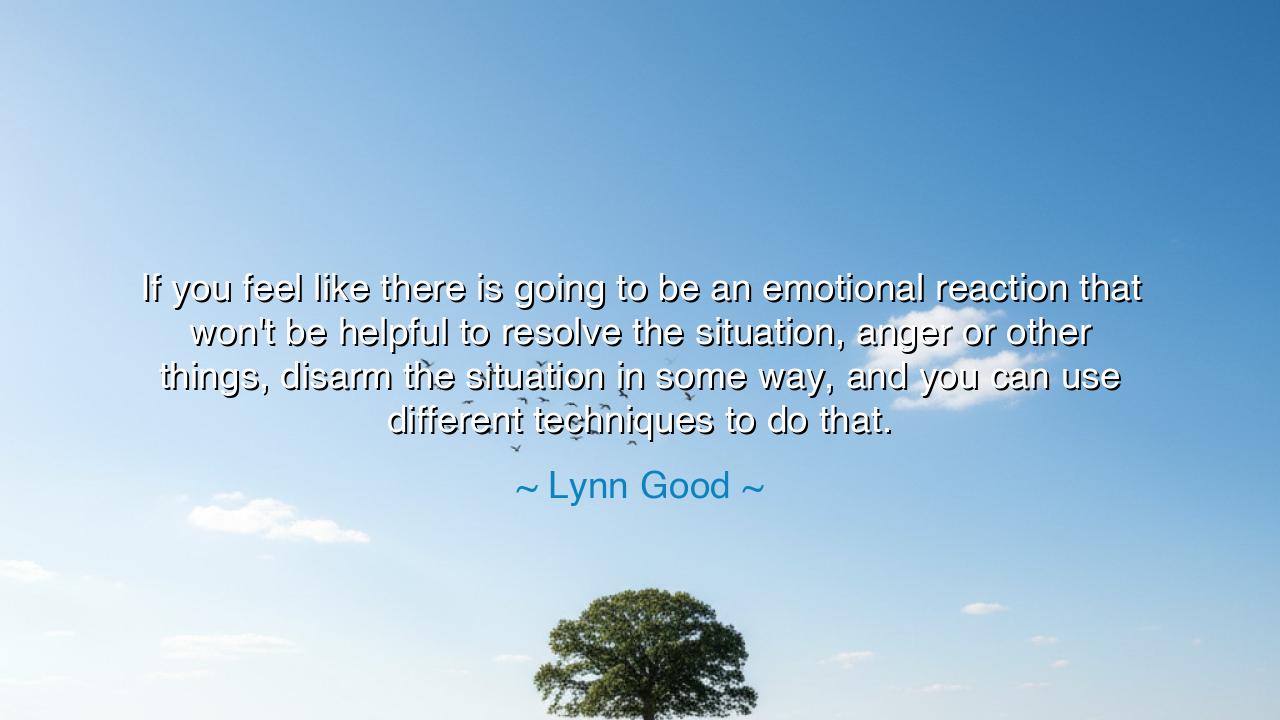
If you feel like there is going to be an emotional reaction that
If you feel like there is going to be an emotional reaction that won't be helpful to resolve the situation, anger or other things, disarm the situation in some way, and you can use different techniques to do that.






Host: The quiet of the evening filled the room, offering a peaceful space for reflection. Jack sat at the table, his fingers resting lightly on his cup, considering Lynn Good’s words. Jeeny stood near the window, her gaze directed outward as she contemplated the deeper meaning behind the statement.
Jeeny: “I’ve been thinking about what Lynn Good said: ‘If you feel like there is going to be an emotional reaction that won’t be helpful to resolve the situation, anger or other things, disarm the situation in some way, and you can use different techniques to do that.’ It’s such an insightful perspective on how to handle difficult situations, isn’t it? The idea that we don’t always need to react emotionally—sometimes, the best way to resolve conflict is to disarm the tension before it escalates.”
Jack: “Yes, exactly. Good is pointing out that in moments of conflict or stress, emotions like anger can cloud our judgment and make the situation worse. But we have the ability to step back, recognize those emotions, and choose not to let them control us. By disarming the situation—whether through calmness, humor, or another technique—we create the space needed to approach the problem with clarity and a more rational mindset.”
Jeeny: “Right. It’s a reminder that how we react in stressful situations can make all the difference. Anger or frustration may feel natural in the moment, but they don’t help solve anything. Good is encouraging us to recognize when our emotions might interfere with resolution, and instead, take a step back and use techniques that will de-escalate the situation. It’s about taking control of the moment, rather than letting the moment control us.”
Host: The stillness in the room deepened as they both reflected on how often emotions, particularly anger, can derail discussions or problem-solving. Jack’s fingers rested on the table, while Jeeny’s expression softened, considering the power of choosing how to respond instead of reacting impulsively.
Jack: “It makes me think about how in conflict, we often let our emotions take over without thinking about the long-term effects. Good is reminding us that emotions like anger, while natural, don’t always lead to the best outcomes. They can cloud our ability to think clearly and solve problems. But by disarming the situation, we create a chance to address the issue more effectively.”
Jeeny: “Exactly. It’s about the importance of self-awareness. Good isn’t saying that emotions aren’t valid or shouldn’t be felt. But she’s emphasizing that we don’t always have to act on those emotions, especially when they’re likely to make things worse. If we can pause, recognize our emotional state, and choose a more measured response, we give ourselves a better chance of resolving the situation productively.”
Jack: “And I think it’s about techniques—the strategies we can use to defuse tension. Whether it’s taking a deep breath, shifting the conversation, or simply staying quiet for a moment, there are ways to regain control of our emotions before they control us. In those moments, disarming the situation becomes the key to moving forward.”
Jeeny: “Yes, and it’s not just about the situation itself, but about preserving relationships too. Reacting impulsively with anger can cause damage that’s hard to undo. Good is showing us that by choosing our response wisely, we protect the relationship and keep the focus on resolving the issue, not escalating the conflict.”
Host: The quiet in the room grew deeper, as they reflected on how managing emotions, particularly in times of conflict, requires awareness and intention. Lynn Good had shown them that emotional reactions like anger can be powerful but ultimately unhelpful in resolving conflicts. Instead, choosing to disarm the situation with mindful techniques creates the space for better problem-solving and understanding. Jack leaned back slightly in his chair, while Jeeny’s gaze turned from the window back to him, both of them understanding the importance of emotional intelligence in maintaining control over difficult situations.
Jack: “So, Good is really showing us that emotional regulation is key to resolving conflict effectively. It’s not about suppressing our emotions, but about recognizing them and choosing how to express them in a way that leads to resolution, not escalation.”
Jeeny: “Exactly. It’s about disarming the situation with calmness or techniques that shift the focus away from heightened emotions and back to the issue at hand. Good is reminding us that we have the ability to control how we respond, and that choice can make all the difference in how we move through difficult situations.”
Host: The evening had fully settled in, the quiet understanding between them a reminder that how we react in moments of tension can shape the outcome of our interactions. Lynn Good had reminded them that emotional reactions, particularly anger, can cloud judgment and derail resolution. The key is to recognize those emotions, choose to disarm the situation, and approach conflicts with intention, calmness, and clarity. The world outside had darkened, but inside, there was light—a recognition that mindful responses, not emotional reactions, create the space for real resolution and growth.






AAdministratorAdministrator
Welcome, honored guests. Please leave a comment, we will respond soon